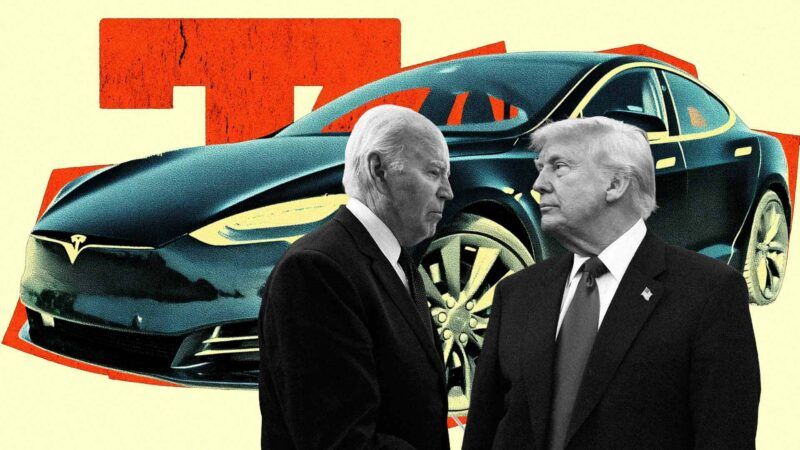Both Biden's and Trump's Policies Are Making E.V.s More Expensive
Slate Auto hopes to offer affordable electric vehicles, but it has to navigate federal incentives and restrictions in the process.

President Donald Trump and former President Joe Biden completely disagree on electric vehicles (E.V.s) and the government's role in fostering their use. Biden's Inflation Reduction Act apportioned billions of dollars for shoring up production and adoption of clean energy, including $7,500 federal tax credits for anyone who buys an E.V.
Politico wrote in December that Trump was "vowing an all-out assault" on Biden's "efforts to make electric vehicles the new king of the American road."
But Trump is not the only one whose policies make it difficult for E.V. companies to innovate. In fact, Biden's signature law is having a very similar effect. A new bare-bones entry into the market provides a perfect illustration.
E.V.s typically cost more than their gas-burning counterparts. Nearly 60 percent of respondents to a June 2024 Associated Press/NORC poll cited higher prices as a major reason they were unlikely to buy a fully electric car.
In April, Slate Auto—an upstart automaker whose backers include Jeff Bezos—announced its first product, the all-electric Slate Truck. Slate hasn't given exact pricing, but it says the truck will cost $20,000 or less when factoring in the $7,500 federal rebate.
Despite the modern trend of enormous trucks, the two-door pickup is considerably smaller than its competitors; the company says it most closely resembles a 1985 Toyota SR5. And unlike most E.V.s, which feature cutting-edge technology, the Slate Truck is pure meat and potatoes. It doesn't even have a radio, and the windows operate by hand crank. There is one model, available in one color.
But Slate apparently had to make several sacrifices in order to get to that price—specifically, sacrificing innovation in order to navigate federal incentives and restrictions.
E.V. batteries carry a much heavier burden than their traditional counterparts, powering not just the car's electronics but also the motor. Slate plans to build its truck with batteries made from nickel, manganese, and cobalt (NMC). NMC batteries were common for many years, but automakers are starting to switch to lithium iron phosphate (LFP) batteries. Each has benefits, but overall, LFP batteries are cheaper, they charge faster and last longer, and their components are more easily sourced.
Still, Slate plans to use more expensive and less efficient NMC batteries because it's the only way to qualify for the federal rebate.
"We've gone with more of what's in the mainstream right now and that many others in the industry are using. So we're using more of what's been scaled within the U.S.," Slate Auto CEO Chris Barman told InsideEVs. "For LFP, most of those materials would come out of China or elsewhere."
The Inflation Reduction Act established very particular sourcing requirements for the E.V. tax credits: By the end of the decade, a vehicle can only qualify for the credit if 100 percent of its battery's components are "manufactured or assembled in North America" and 80 percent of the battery's critical minerals are "extracted or processed in the United States or a U.S. free-trade agreement partner or recycled in North America."
The same week Slate Auto debuted the Slate Truck, South Korean battery manufacturer SK On announced it would build NMC batteries for the trucks in the U.S.
Setting aside Biden's sourcing requirements, Trump's tariffs would effectively put Chinese-sourced materials out of reach: Last month, the president imposed 10 percent tariffs on most countries, while tariffs on China currently stand at 124 percent.
"Our mantra from the beginning was we wanted to source as much domestic content as we could," Barman added. To that end, Slate hopes to further avoid tariffs by building its truck in Indiana. But as InsideEVs' Tim Levin noted, "There are some old-school parts it needs that simply aren't made in the U.S. anymore. For example, Slate imports its hand-crank window systems from Brazil," on which Trump applied 10 percent tariffs last month.
Trump clearly has little love for E.V.s, saying on the campaign trail he would kill the tax credit for E.V. purchases. Killing that incentive could have positive effects on the market, allowing companies to source their parts and components more efficiently. But Trump's tariffs would just drive those costs right back up.
Automakers have spent years chasing the goal of E.V.s that are affordable for everyday consumers. Tesla CEO Elon Musk promised in 2020 that within three years, his company would develop a passenger vehicle that only cost $25,000; four years later, Musk told investors that a $25,000 Tesla was "pointless," "silly," and "completely at odds with what we believe."
A no-frills electric truck costing less than $20,000 could be revolutionary. But the policies of each of the last two presidents make it increasingly difficult to achieve that goal as efficiently as simply letting the market lead.


Show Comments (54)